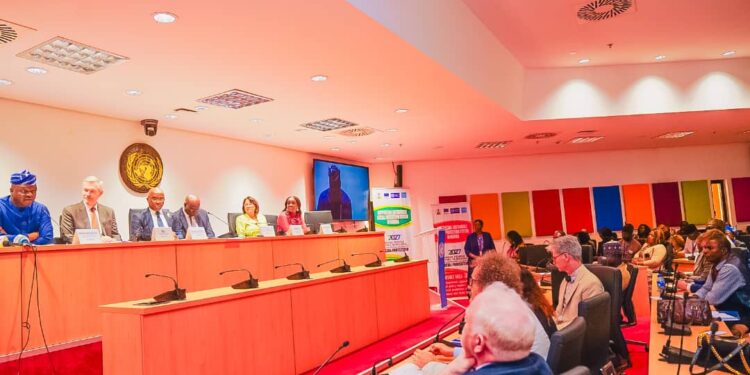The European Union (EU) has reaffirmed its commitment to social welfare in Nigeria by pledging €46 million towards strengthening the country’s social protection system. This financial commitment is part of a newly launched initiative titled “Sustainable Social Protection System in Nigeria” (SUSI) and is expected to bolster Nigeria’s ability to provide targeted and data-driven social assistance to vulnerable communities.
The program was officially unveiled at the United Nations House in Abuja, marking a significant milestone in ongoing efforts to enhance social safety nets, poverty reduction, and economic stability in Nigeria.
A Strategic Partnership for Social Development
The Federal Ministry of Budget and Economic Planning (FMBEP), in collaboration with the EU, spearheaded the intervention program, which seeks to address key gaps in Nigeria’s National Social Protection Register (NSPR). The initiative will improve the register’s effectiveness as a planning tool for resource allocation, policy development, and crisis response.
A statement released on Friday, March 14, 2025, by Osagie Jacobs J.I., Director of Information & Public Relations at the FMBEP, highlighted the importance of the project in enhancing Nigeria’s shock-responsiveness to economic and social crises affecting vulnerable populations.
Implementation Plan and Coverage Areas
The Sustainable Social Protection System in Nigeria (SUSI) program will be implemented over three years and will initially cover four states:
- Abia
- Benue
- Oyo
- Sokoto
The initiative will focus on strengthening social safety nets at both federal and state levels, ensuring better preparedness for economic fluctuations, natural disasters, and public health emergencies.
Key Objectives and Expected Impact
The EU’s €46 million investment will be directed towards achieving the following goals:
✅ Strengthening the National Social Register – Ensuring it serves as an accurate and effective tool for identifying and assisting vulnerable populations.
✅ Enhancing Crisis Responsiveness – Building the capacity of federal and state governments to respond to economic downturns and social emergencies.
✅ Improving Policy Implementation – Supporting data-driven decision-making in the allocation of social benefits and resources.
✅ Developing a More Efficient Social Protection Management Information System (SPMIS) – Establishing a centralized digital platform for monitoring, evaluation, and policy adjustments.
✅ Building Legal and Institutional Frameworks – Strengthening governance structures to support sustainable social protection policies in the long run.
Key Implementation Partners
The implementation of the program will be led by:
🟢 United Nations Children’s Fund (UNICEF) – Providing technical expertise, program design, and policy advisory services.
🟢 International Labour Organization (ILO) – Assisting with labour-related policies, employment strategies, and social security mechanisms.
🟢 Federal Ministries of Humanitarian Affairs & Poverty Alleviation, and Labour & Employment – Ensuring effective coordination, policy alignment, and on-ground execution.
Government’s Commitment to Social Protection
Speaking at the launch, the Minister of Budget and Economic Planning, Abubakar Bagudu, emphasized the significance of the partnership, stating that it represents a major step forward in Nigeria’s social protection efforts.
“The Nigerian government remains committed to ensuring that social protection programs are robust, transparent, and impactful. This partnership with the EU will enhance our ability to protect the most vulnerable citizens and provide a framework for long-term economic resilience.”
Bagudu also reiterated the importance of leveraging international collaborations to address socio-economic challenges, particularly in areas such as poverty reduction, unemployment, and social inclusion.
EU’s Ongoing Commitment to Nigeria’s Social Development
The European Union has long been a key development partner for Nigeria, funding numerous humanitarian and social welfare projects aimed at improving healthcare, education, economic inclusion, and governance.
Previous EU-supported initiatives have included:
✔ The EU Trust Fund for Migration – Supporting migration management and refugee protection.
✔ The EU-Nigeria Health Sector Strengthening Project – Focused on improving healthcare access and maternal-child health.
✔ The EU Rural Development Programme – Enhancing agriculture, food security, and rural employment.
With the launch of the Sustainable Social Protection System in Nigeria (SUSI), the EU is reaffirming its long-term commitment to Nigeria’s socio-economic stability. The program is expected to create a more inclusive and resilient social protection framework, ensuring that the most vulnerable populations receive adequate support during economic downturns, health crises, and other emergencies.
Looking Ahead: A Brighter Future for Social Protection in Nigeria
The SUSI project represents a significant milestone in Nigeria’s quest for a robust and sustainable social protection system. By leveraging international partnerships, digital innovation, and evidence-based policymaking, the initiative aims to reduce poverty, promote economic security, and create a fairer society.
- With €46 million in funding, four pilot states, and multi-agency implementation, will this be the breakthrough Nigeria’s social welfare system needs?
- What are your thoughts on this EU-Nigeria partnership? Drop your comments below!
















Got a Questions?
Find us on Socials or Contact us and we’ll get back to you as soon as possible.